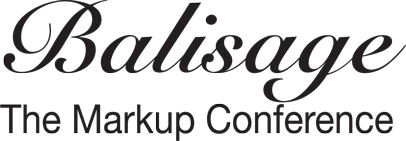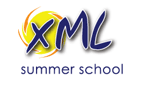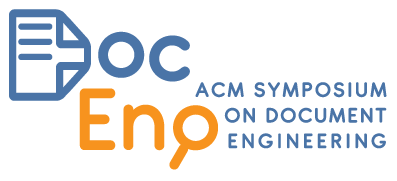Schedule for Thursday
| Time | Room RB209 | Room RB210 | Room RB211 |
| 9:00–10:00 | Registration | ||
| 10:00–11:30 | oXygen Users Meetup | XSL-FO, CSS and Paged Output – hosted by Antenna House | XForms Tutorial: Declarative Applications with XML |
| 11:30–12:00 | Coffee break | ||
| 12:00–13:30 | oXygen Users Meetup | PrintCSS tutorial | Schematron Users Meetup |
| 13:30–15:00 | Lunch break | ||
| 15:00–16:30 | oXygen Users Meetup | CSS Print Workshop | XProc 3.0: Updates, examples, and implementations |
| 16:30–17:00 | Coffee break | ||
| 17:00–18:30 | oXygen Users Meetup | CSS Print Workshop | |
How unconference day will be organized
In both morning and afternoon there will be two 1.5 hour long slots separated by coffee break. Sessions will be running in three parallel rooms. Lunch will be provided for attendees with a full-pass.
Program of respective sessions is completely in hands of session organizer. So any queries about particular session should be directed to the session organizer.
Location
The first conference day takes place in the same venue as the main conference. However it is situated in the different building. It is best to use campus entry from the Italská street. You can see entrance and explore area using Google Streetview.
Just use entrance from Italská street and continue straight inside building until you reach atrium. Then use stairs to go one floor up and then look around for room RB209, RB210 or RB211 (alternatively you can use elevators on the left side and go to the floor marked as 2 on the control panel).
Session details
oXygen Users Meetup
organized by George Bina
The oXygen users meetup is a great opportunity to meet oXygen developers as well as other oXygen users. The various sessions we host cover both how oXygen supports you for XML development and XML authoring, presented by our developers and we always try to also invite some of our users to share their experience.
» See more detailed schedule
XSL-FO, CSS and Paged Output hosted by Antenna House
organized by Michael Miller and Tony Graham
Producing formatted pages is still important to many of us. The intent of the Antenna House Unconference session will be to again share developments and experiences in producing paged media and to discuss topics of interest.
This 90-minute Unconference Day session will be a session of two halves: we’ll talk with you about the state of Antenna House software – particularly about the upcoming Antenna House Formatter V7 – and you can talk with us and with your peers about challenges that you’ve faced or features that you’d like to see.
Antenna House Formatter V7 is the first major release of Formatter in over seven years. During those seven years, we have had six point releases and over 50 maintenance releases. Point releases and MRs add features, change behaviors, and fix bugs. Major releases move and expand the direction of the product. One of the main enhancements V7 will offer is further improved typography. For this session, we will not only look at how V7 enhances typographical capabilities, but we will also look at typography as it relates to today’s requirements in an automated solution.
Once again, this is an opportunity to brainstorm with the assembled about a challenge you’re facing and are trying to solve.
If you have an interesting example to share, please get in touch with Michael Miller.
We want this session to address what you are interested in. Give us your comments!
The following are possible topics. The exact makeup will depend on what you, the users, want to see or present:
- Examples of really challenging formatting requirements and how they were handled
- Show and tell – Your interesting formatting examples:
- The challenges
- The final output
- How would you do this with XSL-FO?/How would you do that with CSS?
- Is quality typography important?
- Some really interesting formatting requirement to duplicate historical document
- The challenge
- Any ideas?
XForms Tutorial: Declarative Applications with XML
organized by Steven Pemberton
In the 50s, when the first programming languages were designed, computers cost millions, and relatively, programmers were almost free. Those programming languages therefore reflected that relationship: it didn’t matter if it took a long time to program, as long as the resulting program ran as fast as possible.
Now, that relationship has been reversed: compared to the cost of programmers, computers are almost free. And yet we are still programming them in direct descendants of the programming languages from the 50’s: we are still telling the computers step by step how to solve the problem.
Declarative programming is a new approach to applications. Rather than describing exactly how to reach the solution, it describes what the solution should look like, and leaves more of the administrative parts of the program to the computer.
One of the few declarative languages available is XForms, an XML-based language that despite its name is not only about forms. Large projects, at large companies such as the National Health Service, the BBC and Xerox, have shown that by using XForms, programming time and cost of applications can be reduced to a tenth!
This session introduces XForms, and shows several amazing applications that can be written in only a few dozen lines.
PrintCSS tutorial
organized by Andreas Jung
The tutorial will be based on my print-css.rocks project and will give some insights into the “CSS Paged Media” standard, the tools and in particular into different aspects of the “PrintCSS” features.
Topics:
- What is PrintCSS?
- Overview and tools
- Examples and usecases
- print-css.rocks project
- Basic and common “PrintCSS” features
- The missing parts and the bad parts
Schematron Users Meetup
organized by Andrew Sales and Tony Graham
Schematron is a language for making assertions about the presence or absence of patterns in XML documents. It is widely used as an adjunct or an alternative to grammar-based validation of XML documents using a DTD, W3C XML Schema, or RELAX NG.
If you don’t know Schematron, this session will give you the introduction that you need to understand why other people are using it and why it features in conference presentations. If you already know Schematron, this session will bring you up to date with the current state of the Schematron standard and software as well as show you ways that other people are using Schematron, possibly ways that you haven’t thought of yet.
Following a brief introduction to the technology, and an update on the ISO standard and its implementations, the line-up will be:
- David Maus: further work on the recent recent XSLT-based implementation, SchXslt; and a Schematron conformance test suite.
- Octavian Nadolu: Schematron for Markdown and JSON
- Colin Mackenzie: Schematron outside the XML editor – practical use cases
- Nico Kutscherauer: overview of Schematron Quick Fixes (SQF) and an update on its standardization process from the co-editor of the spec
- Nigel Whitaker: Using SQF for XML merge conflict resolving
- Nico Kutscherauer: Standalone SQFs
- Gerrit Imsieke: XVRL Update
- Matthieu Ricaud-Dussarget, Christophe Marchand and Jim Etevenard: XVRL in action
CSS Print Workshop
organized by Rachel Andrew and Jirka Kosek
This workshop is about the current state and future of print related CSS specification. More detailed schedule and info about active participation is available at https://wiki.csswg.org/planning/print-workshop-2020
XProc 3.0: Updates, examples, and implementations
organized by Achim Berndzen, Gerrit Imsieke, Erik Siegel and Norman Walsh
The XProc Next Community Group expects to have published its “final” reports for the XProc 3.0 core language specification and standard step library in time for XML Prague 2020.
This unconference slot will provide attendees with a summary of the latest updates to the language, examples of pipelines in operation, a review of the state of implementations, and an opportunity to ask questions and make proposals for new step libraries.












